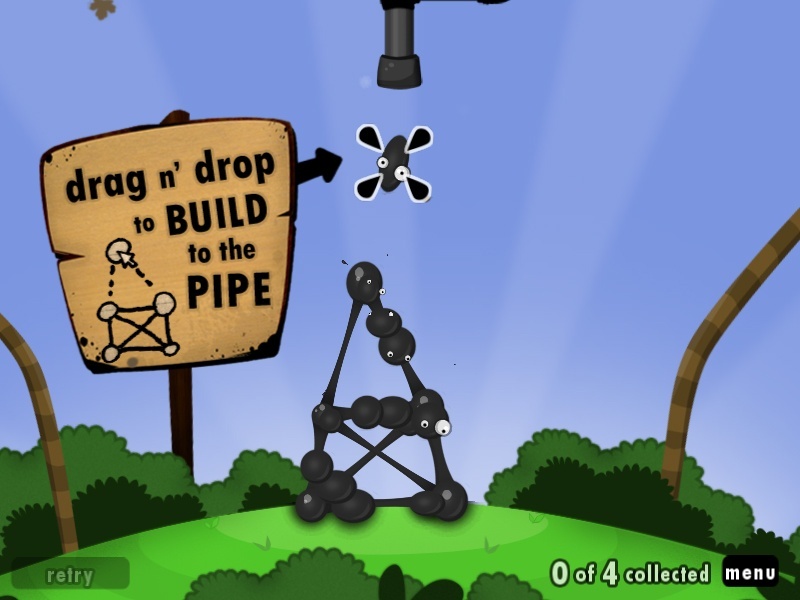World of Goo (PC) Review
By Athanasios  11.03.2017
11.03.2017

Visuals-wise, 2D Boy, along with its (sort of) spiritual successor, Tomorrow Corporation, are the indie equivalents of Oddworld Inhabitants, as their creations use the same, and very distinctive style; a style that won't be exactly everybody's cup of tea. Compared to the stunningly beautiful Oddworld: Abe's Oddysee, for instance, the games from those teams look a tad… amateurish. Those who will look past their appearance, however, will get the chance to enjoy some fine, fine gameplay. Such is the case with World of Goo - a physics puzzler that looks very… freeware, and yet manages to be almost as fun as the genre's best. With World of Goo, Little Inferno, and Human Resource Machine all heading to Nintendo Switch very soon, Cubed3 continues its look back at Tomorrow Corporation's titles, following on from the recent look at
It's hard to realise it initially, but there's a plot here; one that seamlessly blends silliness with a dark ominous aura; one that actually manages to be quite interesting and mysterious… and all despite the fact that this is just a simple puzzle game where the purpose is to lead a bunch of gooey balls, or 'Goo Balls,' to safety - in other words, this is Lemmings, but instead of cute, death-prone rodents, you get a couple of bouncy, wide-eyed blobs.
Like with Lemmings, though, World of Goo's "protagonists" come in all shapes and colours, and, as a result, have their own unique properties and strengths. There are Goo Balls that can be used as permanent building blocks; Goo Balls that act as balloons; Goo Balls that drool and create long, hanging threads; and many more. The player is slowly introduced to each one, learning what they can do, and applying that knowledge to move on, as is usually the case in the genre.
The 40+ levels of the campaign mode have a pretty impressive variety of challenges, and, generally, the title at hand can be quite the tough nut to crack at times. In the same breath, however, it manages to have a very strong casual-friendly and sand-box-esque feel, as it's less about precision, and more about experimentation, less about following a strict number of "steps," and more about fiddling around with the environment. That's basically trial-and-error, but the enjoyable kind.

The great thing is that World of Goo allows for a varied way of playing. Some will simply enjoy it as they would do so with a coffee break, some will simply try to "beat the game," but there's also an OCD "mode," which forces you to complete a level after meeting certain perquisites, like saving a certain number of Goo Balls, or making less than 10 moves or something. As a cherry on top, the extra Goo Balls saved in levels get thrown into a nice little meta-game, where the purpose is to build the highest tower possible - a mode that can be insanely addictive at times, especially as connecting the game online allows for viewing of other players' towers from around the world.
As mentioned earlier, the puzzle variety is pretty good… but, for some strange reason, that soon turns out to be one of the game's flaws! Confused? Well, here's why that happens. The whole variety thing means that almost every stage provides a brand new obstacle to overcome, and one that doesn't feel similar to the previous ones. Great, right?! Initially, yes, but as the levels become more and more difficult, they begin to feel progressively… chore-ish.
Simply put, instead of the traditional "each level requires what you've learned so far, plus one new thing," most stages in here make those in control feel like newbies, and, in the latter half of the game, the whole process of trying something out only to realise that it doesn't work, can be quite annoying. The good thing? Despite this minor (or major, depending on your personal taste) issue, World of Goo can be quite the pleasant ride - although it's definitely one that's far better in short bursts.

Cubed3 Rating
Very Good - Bronze Award

As physics puzzlers go, World of Goo belongs somewhere between 'great' and 'meh…' as it can provide some fantastic brainteasers, while at the same time bore or annoy to death. On the whole, however, and especially for those who can stomach its sandbox-like, trial-and-error nature, it's a title worth your time, and the small amount of money required to get it.
Comments
Comments are currently disabled

 Sign In
Sign In Game Details
Game Details
 Out now
Out now  Out now
Out now  None
None  Out now
Out now  Subscribe to this topic
Subscribe to this topic Features
Features






 Top
Top

